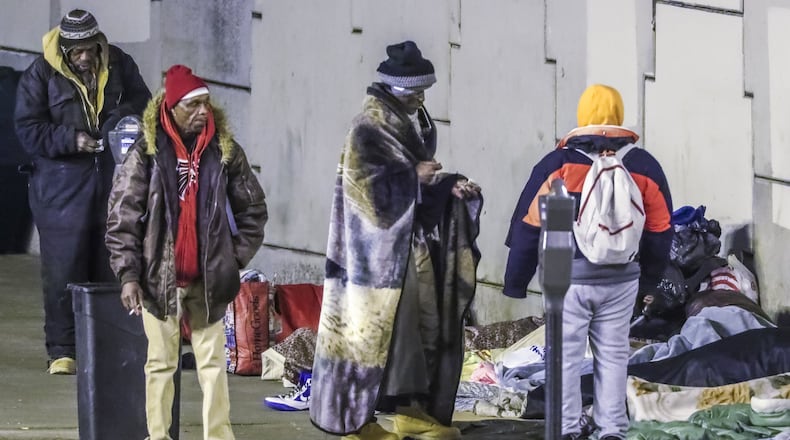Atlanta officials are locked in a dispute with one of the South’s leading civil rights groups over whether they are unconstitutionally warehousing homeless residents in the city’s jail to clear streets for the Super Bowl.
The Southern Center for Human Rights said there are strong signs that a recent crackdown on encampments and reports of an uptick in minor arrests is an attempt to “sanitize the image of downtown at the expense of our homeless citizens,” according to a letter the nonprofit’s lawyers sent to Mayor Keisha Lance Bottoms and Police Chief Erika Shields.
“Our hope is the city is going…to make as much effort to house the homeless population as they are doing in other areas to prepare for the Super Bowl,” said Gerry Weber, a Southern Center lawyer who drafted the Jan. 24 letter. The city informed the center it would be unable to provide key records of these arrests until after the big game
Bottoms and Atlanta City Detention Center officials have said repeatedly that a recent crackdown on homeless camps has nothing to do with the city's role hosting the most-watched television event in America. Atlanta Department of Corrections Chief Patrick Labat stressed that the city police have made no arrests for urban camping, an ordinance that critics say allows police to arrest people solely because they are homeless.
The corrections chief did not answer written questions from the AJC about bookings on other charges commonly used to arrest homeless people, such as soliciting money. But records provided to the AJC by the Southern Center show about 20 arrests of people with no addresses or whose addresses were listed as “homeless” from Jan. 18 to 23, the most recent arrest records in its possession.
Charges included walking on a controlled-access highway and violating a city ordinance that requires sidewalks to be kept clean, the records show.
The lists also show inmates with addresses that match those of homeless services organizations.
Grassroots Atlanta criminal justice reform group Women on the Rise announced on its Facebook page the number of detention center bookings jumped by more than 40 percent last weekend, then dropped during the week. A representative did not provide additional information Friday, saying that the group’s spokespeople were out of the office in all-day meetings.
Federal courts have ruled that sweeps of the homeless can amount to cruel and unusual punishment if a city fails to provide an alternative to the streets, Weber said. Service providers have complained that the 2017 closure of the Peachtree Pine shelter made the city’s shortage of emergency beds worse.
City offering some services
Homeless advocates have been leary of the city’s treatment of the homeless ever since the 1996 Olympic Games, when they sued the city and alleged police were rounding up homeless individuals to keep them off the streets during the crush of Olympic visitors.
Late last year, advocates pushed local governments to open a day shelter before the Super Bowl at the long-shuttered Fanplex facility, an arcade and mini-golf course near the former Turner Field.
But the effort was rebuffed. Marvin Arrington, a Fulton County commissioner and a member of the Atlanta-Fulton County Recreation Authority, said the building had already been rented during the Super Bowl and there wasn’t enough time to hold board meetings required to approve the project.
Moki Macias, the executive director of the Atlanta-Fulton County Pre-Arrest Diversion Program, confirmed this week that an alternative location was never found. An effort to convince Atlanta to keep its warming shelters open through the weekend, when temperatures are expected to be well above freezing, failed as well.
Despite these shortcomings, the city and civic leaders have managed to provide the services that the homeless need, said George Chidi, the director of social impact for the Atlanta Downtown Improvement District, which collects taxes to promote and support downtown development.
“We’ve done everything we could so no one will be able to accuse the city of choosing Super Bowl fans with money over poor people on the street,” Chidi said.
Others are skeptical. In recent days, advocates have recruited volunteers to interview homeless residents about their experiences with police during Super Bowl festivities, organizers said. Nearly 40 have signed up to monitor courts after the Super Bowl for signs that the homeless were targeted.
Workers for SafeHouse Outreach in downtown Atlanta have not noticed an uptick in arrests of their clients, but Chief Executive Officer J. M. Bray said the increased police presence will likely mean more ticketing for quality-of-life violations. He found it difficult to believe that the latest crackdown on homeless camps had nothing to do with the big game.
“This is a common practice year round and I am sure that the scheduling of this most recent ‘clean up’ was intentional,” Bray said. “The timing is too coincidental for it to not have been.”
‘I’m just trying to stay out of the way’
On Thursday, most of the arrestees who appeared in Atlanta municipal court when Southern Center lawyer Tiffany Williams Roberts visited showed signs they were homeless.
“The overwhelming majority of people were visibly struggling with things that homeless people struggle with, such as hygiene,” Roberts said.
Longtime outreach worker Marshall Rancifer said people who called him for rides to local warming centers disappeared before he could pick them up. He worries they were arrested.
“I’ve witnessed homeless people being driven into the sally port of the jail,” said Rancifer, founder of the Justice for All coalition. He has reviewed some of the Southern Center’s arrest records.
Downtown’s homeless residents have spent the nights leading up to the Super Bowl dodging police.
On a recent evening, Tavius Freeman had a $1 bill in his jacket pocket. He hoped to find $9 more to spend the night at the Atlanta Recovery Center instead of on a downtown sidewalk.
The streets have been home for the 25-year-old, off and on, since he was 19. Freeman said his addictions to cocaine, marijuana and ecstasy pills kept him from holding a job.
“I’ve been clean for about 14 hours,” Freeman said. He couldn’t talk long. Police were nearby. Freeman didn’t want to give them any reason to approach him.
“They don’t want you in the way of the money,” Freeman said. “I’m just trying to stay out of the way.”
Our reporting
Last month, the AJC reported that the city was seeking to break up camps of Atlanta’s homeless and find them shelter from the cold. Though the city denied the effort was related to the Super Bowl, today’s story reports that a prominent civil rights group believes the city is seeking to sanitize the city’s image ahead of Sunday’s game.
The Latest
Featured




